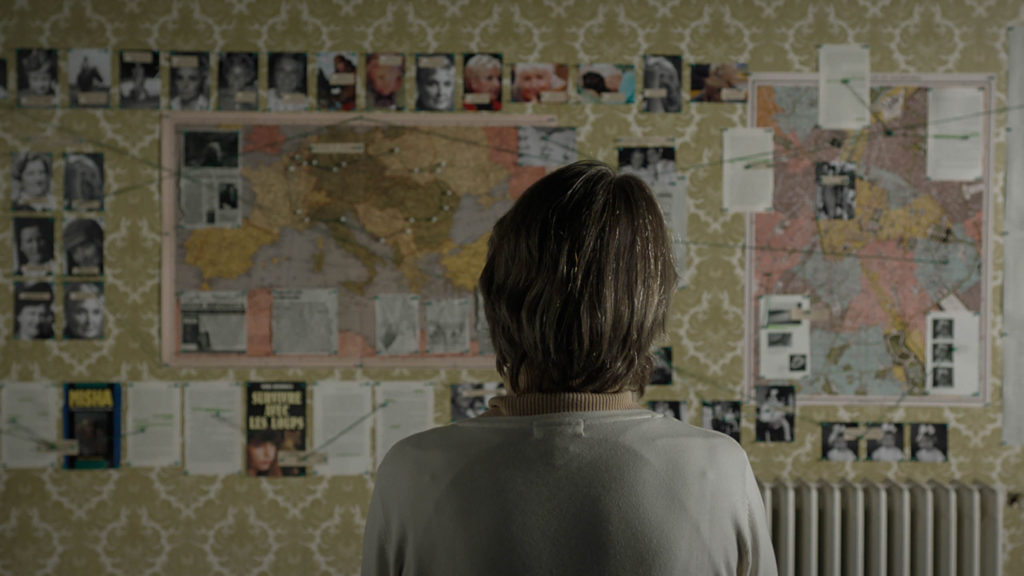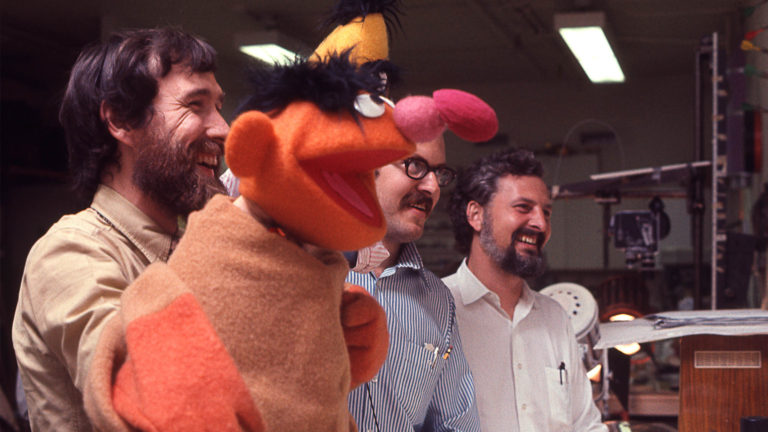Street Gang: How We Got to Sesame Street (2020 | USA | 107 minutes | Marilyn Agrelo)
It might have much new to say, but Street Gang: How We Got to Sesame Street compiles the origin story, greatest hits clips, and hilarious outtakes from a groundbreaking show that was built from piles of government money and extraordinary imagination by a makeshift family of workaholic weirdos. What’s not to love?
Created by the Children’s Television Workshop, a coalition of educators and writers who were a product of a counter-culture era that saw increased attention to protest and civil rights, Sesame Street quickly stood out as unique for its fusion of advertising techniques in service of educational content, a focus on reaching inner-city children of color, and integrated casting (humans and muppet alike). It also, of course, benefitted from the special sauce of Jim Henson and Frank Oz’s muppets, whose fuzzy presence alongside the humans of the neighborhood riveted children’s attention and kept their parents entertained, too.
Director Marilyn Agrelo assembles contemporary interviews with surviving creators and cast members (or their adult children) alongside archival footage from the show’s early days. There’s light attention to the behind-the-scenes power dynamics, prickly personalities, resistance to the show from less-enlightened states, and the matter of the Two Gordons, but by and large the documentary is largely celebrates rather than interrogates. And while I might have been interested to know whether the diversity on screen was reflected in the writer’s room or how things have changed over time and with the move to HBO, I also turned to a puddle of nostalgic goo when they talked about the origins of “It’s Not Easy Being Green”, wiped away tears when they revisited the episode in which Big Bird learned about death, marveled at the lineup of guest visitors to the neighborhood (one montage features James Taylor, Johnny Cash, Loretta Lynn, B.B. King, and Dizzy Gillespie; another has Jesse Jackson leading a crowd of children in self-affirmations!), and reliably cracked up at every Henson & Oz outtake.
The show is beloved by generations for a reason, and this trip down memory lane is sure to be a crowd-pleaser. The love that the creators put into it shines through in the documentary as well as the programming that shaped so many childhoods.

Searchers (2021 | USA | 81 minutes | Pancho Velez)
How did it take this long for someone to make a documentary that’s just watching people swiping on apps? And how did I make it through 120 minutes in the close company of pandemic daters in New York without having an actual panic attack?
For that, credit director Pancho Velez’s innovative approach to spectator dating. Everyone loves to glimpse over a friends’s shoulder while they’re surveying the landscape of potential partners on a glowing phone in a dark bar, but here Velez rigged-up a contraption that allows the audience to look directly at the face of the swipers while they’re appraising their prospects, an Interrotron for app-snooping. Via this ingenious development, much of this documentary is filmed direct-to-camera, its subjects gazing into the screen at potential mates, while directing an offscreen assistant to swipe right or left and idly chatting with Velez about their preferences. Velez casts a wide a diverse net in his survey of the app-based dating scene: from young women browsing a sugar daddies site (contemplating potential “allowances”), to a gay guy and his female roommate negotiating the vagaries of a Grindr chat, forty somethings coming up with clever responses to OK Cupid prompts, and senior citizens decoding the language of expected intimacy on Hinge.As peak voyeurism, it’s both squirmy and riveting.
He supplements these direct observations with candid traditional interviews about people’s experiences on the apps that draw from an entertaining cast of characters — from a 88 year old woman who can barely bring herself to consider seventy-year-old men, a pair of sixtyish guys who bicker about romanticism vs. the businesslike aspects of online dating, and a forty something woman explaining to her younger friend how dealbreakers fall away with age — and reveal commonalities across the generations (with the exception of the “sugar babies”, everyone wants to date someone ten years younger). He even inserts himself into the film by letting us watch as he fills out a profile and — more bravely — enlisting his mother’s feedback while he reviews potential matches. The pandemic looms in the background, but oddly, is barely addressed in the interviews. In the Q&A, Velez said that it was a choice to not make it feel immediately dated as a “2020 Film”, but the presence of masks (and a lot of non-masks) in crowd shots of New York is sure to do that regardless.
No one in the film seems to love online dating, but no one knows how to quit it either. Watching this warm-hearted and curious film is kind of like that; the false intimacy somehow feels a little bit wrong, but it’s impossible to look away.

Misha and the Wolves (2021 | United Kingdom/Belgium | 90 minutes | Sam Hobkinson)
Like the incredible story of a seven-year-old Belgian girl surviving the Holocaust alone in the woods with the help of some friendly wolves, Sam Hobkinson’s new documentary is so compellingly-told with the familiar tools of modern true-crime storytelling that you barely notice the nagging missing puzzle pieces until after the credits roll.
Misha and the Wolves is multiple stranger-than-fiction stories embedded and intertwined within each other. First, there’s the story of Misha Defonseca, who told her suburban temple her riveting story of being a hidden Jewish child who set off on foot from her adopted Catholic family to seek her parents in Germany, evading Nazis and other dangers through determined cunning and the kindness of animals. There’s also the story of the small time local publisher in the audience who heard the story and, with dreams of massive sales figures and Oprah appearances, convinced Misha put her memoirs on paper. The chain continues with a lawsuit over royalties and a massive judgement that inspires an overdue investigation of the veracity of the story and identity, primarily as a way to avoid crushing bankruptcy.
Hobkinson assembles many of the principals who were part of Defonseca’s ascent to fame, from her neighbors in small town Massachusetts to her culminating European fame, complete with media appearances, university tours, and even movie deals. Alongside these personal connections, he also brings in a coterie of experts, including psychologists, historians, another Holocaust survivor, and even a local wolf expert. Told through interviews, artfully drawn pencil animations, re-enactments, and onsite footage of dusty archives and hand-written records, the stories and characters are so fascinating, with twists and revelations parceled out at such expert pace that it’s easy to ignore how much of the documentary focuses on answers to known questions while choosing (or being forced) to elide the thornier mystery underlying the whole story. It’s a great trick and makes for a relentlessly watchable hour and a half.
Quibbles aside, it has the look and feel of a buzz worthy smash that might even inspire a companion podcast or two.
All three films have encore screenings this week. Header image: Street Gang: How We Got To Sesame Street (Courtesy of Sundance Institute | photo by Robert Fuhring)




